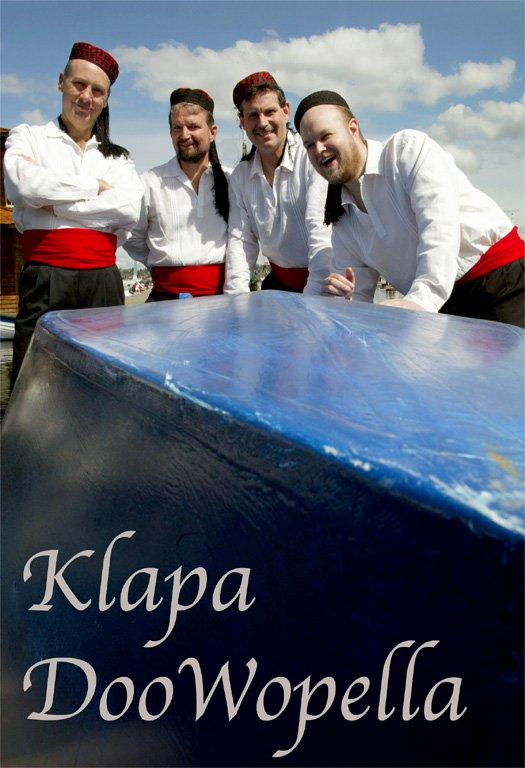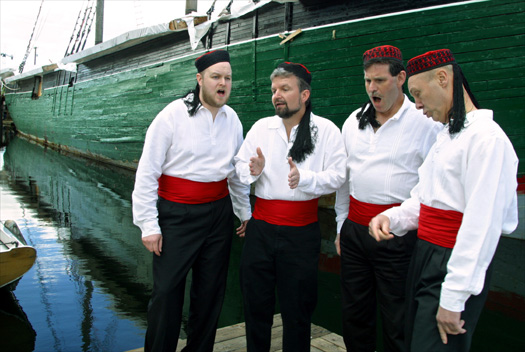KLAPADOOWOPELLA
www.klapa.us

A NIGHT OF KLAPA MUSIC
More than one-hundred miles to the east of Italy is the Dalmatian coast of Croatia. It is typically Mediterranean,
and very mountainous. The crystal-clear Adriatic washes along the hundreds of miles of coastline. The precipitous
Dinaric Alps rise thousands of feet, they being so convoluted and rugged that travel along the coast and its
islands is restricted to marine traffic and a two-lane highway that twists and turns.
Important coastal cities here include Omis, Split, Rijeka, and Dubrovnik. This coast and its cities have been
witness to hundreds of years of strife. During WWII, this and the adjacent Slavic countries were called the
"underbelly of Europe." The spark that started WWI occurred inland, and more recently, atrocities have been
committed between the various Slavic factions.
Even so, the Klapa tradition has been developing for hundreds of years. Originally, groups of men would join
together in their villages and sing folk songs based on love, fishing, and the sea. A unique style developed, and it
was a mix of local dialect and Slavic sentiment, far eastern sound, and Italian harmonic organization.
In good times, and also in bad; on weekends and late into the night, the Klapas would sing. Until the collapse of
the communist government, men's voices could be heard harmonizing in the taverns and along the streets.
Traditionally, these groups singing in four-part harmony would attract small crowds of hangers-on and listeners.
Women occasionally might join in, especially if it was a nationalistic or familiar folk song, but generally the
women enjoyed listening in the background.
The music exhibits tremendous emotion and feel. All the standard and theoretical elements of music can be heard;
complex and free rhythms, folk and Italianate harmonies, dynamics, song and verse. It is joyous and romantic; a way to be released from the cares of the world.
Today, it is hard to gather for singing, as it is difficult for Dalmatians to scrape out a living. The economy is
heavily dependent on tourism, and they therefore restrict their singing to the non-tourist seasons as this is their
only free time for practice. And this is a shame, because people of all ilks love music. Klapa singing perhaps can
be reenergized to entertain both tourist and resident alike.
In a world far away, imagine, then, hearing voices emanating from a nearby square. As you approach, the strains
become louder, but not in a sense of volume; instead, more of an intensity. Men are organized in a circle in the
center of a plaza, the plaza, in turn, overlooking a reflected moon on the surface of the Adriatic sea. A warm
breeze blows through, and on the edges of the stone courtyard, people are seated or standing, quietly listening to
lovely, lovely music.
We have been to such a place and experienced this warm breeze and the view of the glistening sea while singing Klapa songs. We would like to take you there through listening to our CD or enjoying us in live performance.
HISTORY OF KLAPADOOWOPELLA

The Klapa was formed in 1981 in Seattle, Washington, as a result of interest generated in Adriatic Folk singing. It
consisted of as many as eight members, and was originally named "Klapa Sokoli" which in English, means "Eagle
Group."
The Klapa performed actively in the Seattle area for folk festivals and balkan-oriented events. The group also
participated in the famous Omish festival of Dalmatia in the former Yugoslavia where they were, to say the least,
quite a novelty.
The group added American folk tunes over the years, especially "doo-wop" which is comparable to the United States
what Klapa singing is to Dalmatia--that is, an outgrowth of singing on the streets. Thus, the words "doo wop" were
incorporated into the name resulting in the unusual title of "Klapadoowopella."
Songs sung by the "Klapa" are in a number of languages, including Balkan dialects, Russian, Italian, Latin, and, of
course, English.